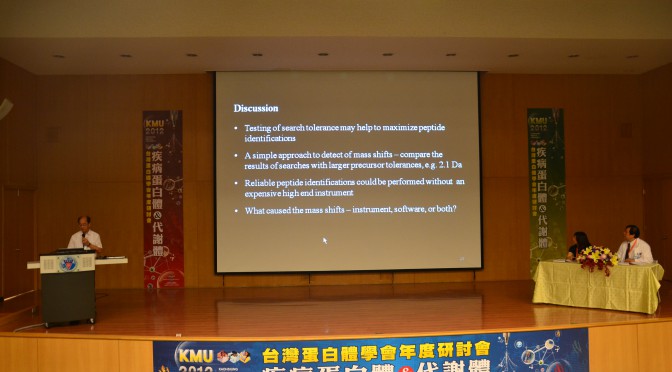The academic research of Kaohsiung Medical University (KMU) initially started from the studies of tropical medicine, Chinese herbal medicine, and venin-antivenin. For more than fifty-nine years, KMU has played a major role in providing various medical and public health services in southern Taiwan. Being as a leading medical center in southern Taiwan, KMU has many strong and highly-experienced research teams. KMU currently has twenty-one undergraduate programs and five independent graduate institutes. In addition to the research on individual, KMU integrates researchers from different fields of study to stimulate interdisciplinary research. In recent, there are several major interdisciplinary research teams has been formed, which include cancer, genomics and proteomics, immune system, neuroscience, sport medicine, nanotech and sustainable medicine, aging health care, stem cell, medical pharmacology, tropical medicine, environmental medicine, gender-based medicine, etc. The school is also very active in promoting the integration of basic and clinical research teams, in forwards to translational medicine research.
Various incentives have been established to encourage faculties to do research. These incentives setup a number of fundings including “Guidelines for Funding Faculty’s Project”, “Guidelines for Funding Newly-hired Faculty’s Projects”, “Guidelines for Funding Returned Faculty from Study Leave”, “Neophyte Researcher Project Pre-review System”, “Research Project Incentive Regulations”, “Incentive for Paper Publishing Regulations”, and “Guidelines for Funding Instructors Participating in International Conferences”. In March 2011, KMU signed a memorandum with Waseda University, in which both schools reached a concrete agreement on issues such as to establish research laboratories in the other’s institute, and to strengthen collaborations and exchanges upon researchers from both sides. The two schools agreed to start with the promotion and investment of the research topics that both are interested in: nanotech and health care, and sport science and health promotion. KMU and University of Arkansas for Medical Sciences (UAMS, USA) has been allied as sister schools for more than 30 years. The form of collaboration had been focusing on personnel training and exchanges in the past. At this time, KMU and UAMS renewed the memorandum, in which both sides agreed to collaborate in dual-degree program, nanotech research, multiple myeloma or other cancer research, and to form a triangular research alliance for nanomedical related research with the National Center for Toxicological Research (USA). And to give more impetus to academic research, KMU is actively forming academic alliances and exchanges with institutes include Academia Sinica, National Health Research Institutes, National Sun Yat-Sen University, Harvard University (USA), National Cancer Institutes (USA), the University of North Carolina at Charlotte (USA), Fukuoka Institute of Health and Environmental Science (Japan), Chi-Mei Medical Center, Changhua Christian Hospital, and etc.
Industry Academia Cooperation
In order to follow government’s development policies and promote cooperation with the industries, with support from the Board, KMU started the Office for Operation of Industry and University in 2013. There are three business divisions, including Academia-Industry cooperation division, IPR Management division and incubation Center. Hopefully this platform can fully provide excellent service between university and company.
Office for Operation of Industry and University (CPIUC) was established on August 1st in 2008; it is responsible for integrating and promoting the business of industry-academia cooperation.
CPIUC combines all resources of several nearby industrial parks and strategic alliances to found a health-care industry platform which helps traditional industries and new enterprises to develop innovative technology and products. With rich research resources and professional technology, we can integrate research and development, clinical trials, technology licensing and commercialization in order to strengthen academic research and industrial innovation, and to lead the regional economic prosperity.
Integration of research resources
In order to efficiently utilize and integrate the high-end instruments in KMU, former President Yu set up Center for Research Resources and Development (CRRD) during his term. We follow the instructions from President Liu to ensure that all the resources are fully utilized. The instructions are Innovation, Knowledge and Mission. The missions of CRRD are stated as follows: (1) to integrate the resources of high-end instruments, management and maintenance for satisfying the demands of researchers; (2) to arrange training courses of instruments and techniques for students and researchers; (3) to develop research platforms for deepening the academic research at KMU; (4) to cooperate with outside research centers for novel research platforms or techniques; (5) to nurture the academic researchers.
We deeply hope that CRRD will be an excellent research center to give excellent support to academic research. Additionally, to deepen KMU’s academic research, we are developing metabolomics platform and interacting with other research centers for sharing instruments and techniques.
Characteristic Research and Development for Environmental Medicine
In 2007, KMU received a research grant from the Ministry of Education for the “Development of an International Outstanding University and Research Center”. In 2008, the Center for Excellence of Environmental Medicine (CEEM) was established as a first-class research center at KMU in order to promote interdisciplinary research in environmental medicine, strengthen teaching efficiency and research performance, and establish platforms for communication as well as cooperation between research groups at KMU and other universities. The main goals of CEEM are: 1) to establish a model at KMU for international cooperation in special R&D projects; 2) to explore the efficiency of collaborative projects, nurture world-class medical research personnel, and integrate research and industry; and 3) to encourage interdisciplinary research, improve the quality and quantity of research papers, and establish KMU as an outstanding and internationally-acclaimed university.





